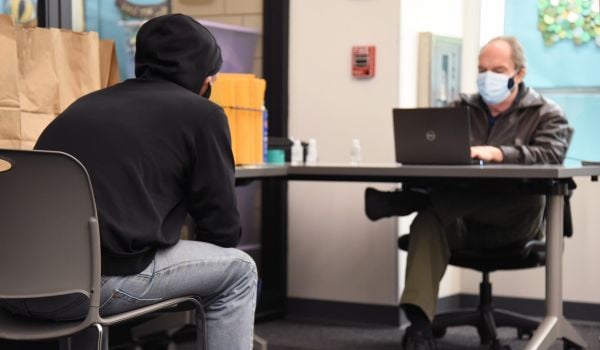St. Louis and six Midwest cities got a grant from the federal government in January to build up their workforce development programs. And while cities getting funds from D.C. to make more jobs is common throughout the U.S., what’s fascinating about the Missouri city is the types of jobs they’re trying to put low-income and disadvantaged workers into.
Traditionally, workforce development programs have aimed at blue-collar or lower-skill jobs that don’t require a traditional four-year degree: construction, manufacturing and some medical careers. But on top of those industries, St. Louis wants to use the $1 million in federal funds to put 250 workers into financial analyst, software developer and medical records coding jobs.
“People come in and want to become a registered nurse, others want to be truck drivers, but that’s because that’s traditional, that’s all they know,” says Stacey Fowler, the office of innovation and industry engagement manager at the St. Louis Agency on Training and Employment (SLATE). She says interested students think of workforce programs as only having the option to connect with a set pool of employers.
“Yeah, you can become a registered nurse, and everyone knows what that is — but what about cybersecurity?” she says. “We have to expand the vision of our job seekers, and haven’t thought about being a lab tech or working for a bioscience company or a software developer.”
Her city is in a paradox of a position. Unemployment has dropped dramatically since the throes of last decade’s recession, from 9.7 percent in 2009 to 3.5 percent in November 2016. That means there were about 104,000 job seekers in the city as recently as 2013, but that number cut down to 68,000 in 2016.
Factories say they’re struggling to find qualified workers to run their machines. Industry owners across the board seem to share a similar gripe; a recent survey of 478 employers in the region found that about half saw the struggle to find skilled workers as their biggest battle.
But there’s still a pool of people in the city that can get into shape for these industries with a little help from programs like SLATE, and the dropping unemployment rates have affected different communities in different ways. Black unemployment, for example, was at 8 percent in November 2016, and in 2014, black unemployment in St. Louis remained a couple percentage points higher than Missouri’s average for black unemployment.
Yet nearly 47 percent of the entire population of St. Louis is black, indicating there’s a disparity between the population makeup and which communities in the city are benefiting from the unemployment drop.
Fowler wants this new grant announcement to change that. Her organization will be blending this money with past funds through federal job programs, like American Apprentice and TechHire — both of which have just started up within the past year.
American Apprentice encourages workforce development organizations to take the apprenticeship model seen in construction and apply that to other industries too, giving workers hands-on experience while in training. TechHire focuses on putting people from disadvantaged communities into tech-related jobs.
Like the most recent grant round, which will push cities closer toward fulfilling new job training changes that came with the Workforce Innovation and Opportunity Act in 2014, St. Louis applied for those grants with partner cities across the Midwest region.
What do those cities all have in common? The need to build a stronger connection with local employers so that job trainees go straight to careers, and industry leaders aren’t left with unmanned machines or biomedical labs when the year comes to an end, says Fowler.
“Some employers [tell us they] want people with experience, but if you can’t get a job,” she says, pausing before laughing at the classic chicken-or-egg scenario. With the three federal grant opportunities lumped together, she hopes they’ll be able to build a better pipeline where employers help train the very workers they’ll later employ.
“We’re trying to get away from that ‘train and pray’ model, where you train people and pray they get to work,” she says. Last week she was meeting with a cybersecurity firm and hopes to get an apprenticeship program set up for that industry soon.
“It’s just a win-win for everyone if we can make this model work,” says Fowler.
The Equity Factor is made possible with the support of the Surdna Foundation.

Johnny Magdaleno is a journalist, writer and photographer. His writing and photographs have been published by The Guardian, Al Jazeera, NPR, Newsweek, VICE News, the Huffington Post, the Christian Science Monitor and others. He was the 2016-2017 equitable cities fellow at Next City.

















